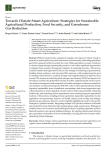Kabato W., Getnet G.T., Sinore T., Nemeth A., Molnár Z. (2025). Towards climate-smart agriculture: strategies for sustainable agricultural production, food security, and greenhouse gas reduction. Agronomy, 01/03/2025, vol. 15, n. 3, p. 565.
https://doi.org/10.3390/agronomy15030565
https://doi.org/10.3390/agronomy15030565
| Titre : | Towards climate-smart agriculture: strategies for sustainable agricultural production, food security, and greenhouse gas reduction (2025) |
| Auteurs : | W. Kabato ; G.T. Getnet ; T. Sinore ; A. Nemeth ; Z. Molnár |
| Type de document : | Article |
| Dans : | Agronomy (vol. 15, n. 3, March 2025) |
| Article en page(s) : | p. 565 |
| Langues : | Anglais |
| Langues du résumé : | Anglais |
| Catégories : |
Catégories principales 07 - ENVIRONNEMENT ; 7.6 - Changement ClimatiqueThésaurus IAMM CHANGEMENT CLIMATIQUE ; AGRICULTURE NUMERIQUE ; ADAPTATION AU CHANGEMENT ; STRATEGIE ; PRODUCTION AGRICOLE ; DURABILITE ; SECURITE ALIMENTAIRE |
| Résumé : | Without transformative adaptation strategies, the impact of climate change is projected to reduce global crop yields and increase food insecurity, while rising greenhouse gas (GHG) emissions further exacerbate the crisis. While agriculture is a major contributor to climate change through unsustainable practices, it also offers significant opportunities to mitigate these emissions through the adoption of sustainable practices. This review examines climate-smart agriculture (CSA) as a key strategy for enhancing crop productivity, building climate resilience, and reducing GHG emissions, while emphasizing the need for strategic interventions to accelerate its large-scale implementation for improved food security. The analysis revealed that while nitrogen use efficiency (NUE) has improved in developed countries, the global NUE remains at 55.47%, emphasizing the need for precision nutrient management and integrated soil fertility strategies to enhance productivity and minimize environmental impacts. With 40% of the world's agricultural land already degraded, sustainability alone is insufficient, necessitating a shift toward regenerative agricultural practices to restore degraded soil and water by improving soil health, enhancing biodiversity, and increasing carbon sequestration, thus ensuring long-term agricultural resilience. CSA practices, including precision agriculture, regenerative agriculture, biochar application, and agroforestry, improve soil health, enhance food security, and mitigate greenhouse gas emissions. However, result variability highlights the need for site-specific strategies to optimize benefits. Integrating multiple CSA practices enhances soil health and productivity more effectively than implementing a single practice alone. Widespread adoption faces socio-economic and technological barriers, requiring supportive policies, financial incentives, and capacity-building initiatives. By adopting climate-smart technologies, agriculture can transition toward sustainability, securing global food systems while addressing climate challenges. |
| Cote : | En ligne |
| URL / DOI : | https://doi.org/10.3390/agronomy15030565 |







